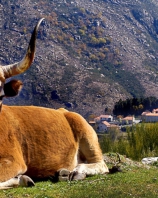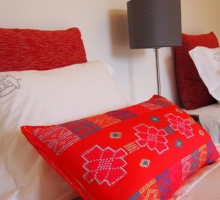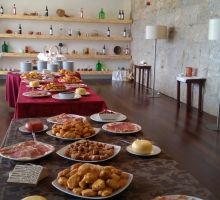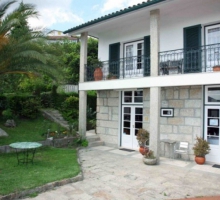The “Peneda-Gerês” National Park was created in 1971 with the ambition to protect about seventy thousand hectares of a single territory. From the fertile valleys to rocky hardship, from murmuring stream, to cascades of white-water, from gentle slopes to wooded cliffs with tens of meters of vertical where only heather and creeping bushes persist – sometimes embellished by “Gerês”’s Lily – up 150 meters to over 1.500 meters above sea level, the Park’s territory offers a diversity and richness without rivals.
The terrain is mainly granite, with rare schistose zones, which gives it a rough aspect and very suggestive track. The people who inhabited this region for millennia have adapted to its harsh landscape, but nonetheless often generous for grazing cattle and growing cultures. The marshes and valleys are fertile agricultural areas, the mountains highlands are abundant pastures. It should not, therefore, be surprising that the agro-pastoral subsistence economy has lasted until almost present-day.
The Biosphere Reserve includes the territories of P. N. P. G., the Natural Park of “Baixa Limia-Serra do Xurés” and covered councils on both sides of the border. The territory is characterized by its hills and Galician-Portuguese plateaus as well as a dense network of water lines, which highlights the wide valley of the “Lima”’s river. The topography, elevation, geological characteristics and the wide availability of water, allows the existence of great floristic, rich habitats, from which stand out woods formations, forest, moors and marshes. 117 endemic species to the Iberian Peninsula are accounted for as well as 2 exclusive to this area. The fauna includes 204 species protected by national and/or international level from which 71 are with endangered species.
The historical heritage includes a variety of Neolithic representation and occupation, as well as an important representation of the Roman occupation and numerous examples of medieval architecture. Quaint villages, terraced architecture, granaries steady, lime meadows, among others, reveal an ingenious capacity to adapt from the population to environmental characteristics. “The high value of the natural heritage, diversity and scenic beauty, mountain topographic characteristics and climatic conditions give the region a strong tourism potential. It meets favourable conditions to the development of economic activities linked to the endogenous resources such as agriculture, cattle breeding and nature tourism enhancing the promotion of sustainable development”
Location: Arcos de Valdevez
The terrain is mainly granite, with rare schistose zones, which gives it a rough aspect and very suggestive track. The people who inhabited this region for millennia have adapted to its harsh landscape, but nonetheless often generous for grazing cattle and growing cultures. The marshes and valleys are fertile agricultural areas, the mountains highlands are abundant pastures. It should not, therefore, be surprising that the agro-pastoral subsistence economy has lasted until almost present-day.
The Biosphere Reserve includes the territories of P. N. P. G., the Natural Park of “Baixa Limia-Serra do Xurés” and covered councils on both sides of the border. The territory is characterized by its hills and Galician-Portuguese plateaus as well as a dense network of water lines, which highlights the wide valley of the “Lima”’s river. The topography, elevation, geological characteristics and the wide availability of water, allows the existence of great floristic, rich habitats, from which stand out woods formations, forest, moors and marshes. 117 endemic species to the Iberian Peninsula are accounted for as well as 2 exclusive to this area. The fauna includes 204 species protected by national and/or international level from which 71 are with endangered species.
The historical heritage includes a variety of Neolithic representation and occupation, as well as an important representation of the Roman occupation and numerous examples of medieval architecture. Quaint villages, terraced architecture, granaries steady, lime meadows, among others, reveal an ingenious capacity to adapt from the population to environmental characteristics. “The high value of the natural heritage, diversity and scenic beauty, mountain topographic characteristics and climatic conditions give the region a strong tourism potential. It meets favourable conditions to the development of economic activities linked to the endogenous resources such as agriculture, cattle breeding and nature tourism enhancing the promotion of sustainable development”
Location: Arcos de Valdevez










